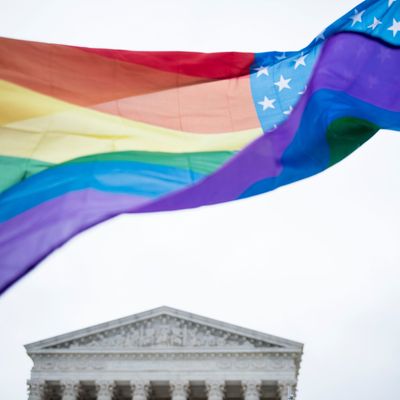
Six justices of the Supreme Court, including Republican appointees John Roberts and Neil Gorsuch, declared today that facts don’t care about employers’ feelings: It’s illegal to fire someone because of their sexual orientation or gender identity. “An employer who fires an individual for being homosexual or transgender fires that person for traits or actions it would not have questioned in members of a different sex,” wrote Gorsuch, who was also joined by all four Democratic appointees. “Sex plays a necessary and undisguisable role in the decision, exactly what Title VII forbids,” he continued, meaning the provision of the 1964 Civil Rights Act that barred discrimination in employment “because of sex.”
In theory, the justices reached this conclusion on what Gorsuch called “no more than the straightforward application of legal terms with plain and settled meanings.” It was not enough for employers to say they were motivated by something other than sex when they fired someone, or that they treated gay men and women or transgender men and women equally poorly, he wrote; that was still illegal sex discrimination. “Intentionally burning down a neighbor’s house is arson, even if the perpetrator’s ultimate intention (or motivation) is only to improve the view,” Gorsuch put it dryly.
But for an opinion that happened to be issued a day after an estimated 15,000 people marched in New York to say black trans lives matter, and just a couple days after the Trump administration issued new rules discriminating against LGBT and abortion patients, there was more at stake than which school of constitutional interpretation carried the day or the words on paper. By formally recognizing LGBT individuals into federal anti-discrimination law, the Court was effectively rejecting the siloing of rights, the pitting of historically marginalized groups against each other — including the claim, most prominently aired by J.K. Rowling, that trans rights come at the expense of cisgender women. That’s true even if you’ll never get Roberts or Gorsuch to say as much (though they did sign their names to an opinion that deferred to the plaintiff’s preferred gender pronouns).
A typically dyspeptic dissent from Samuel Alito, joined by Clarence Thomas, accused their colleagues of legislating from the bench. In a now familiar move, Brett Kavanaugh tried to split the difference. Kavanaugh’s dissent offered a mini soliloquy on what he sees as the inviolable difference between the LGBT rights and the women’s rights movements. “Seneca Falls was not Stonewall,” he intones. “The women’s rights movement was not (and is not) the gay rights movement, although many people obviously support or participate in both. So to think that sexual orientation discrimination is just a form of sex discrimination is not just a mistake of language and psychology, but also a mistake of history and sociology.”
Let’s give Kavanaugh this: He’s not the first person to have sketched out this dichotomy, and that includes myopic activists over the centuries — including at Seneca Falls — who failed to recognize the intersections, though some did. But we never would have had a ban on sex discrimination if civil-rights movements had jealously guarded their assumed boundaries. It’s often said that in the 1964 debate over the Civil Rights Act, some members of Congress inserted “because of sex” alongside race as a poison pill to kill the whole thing. The reality is more complicated. The sex provision had the support of longtime women’s rights activists — including ones who were all too happy to use racist justifications. Representative Martha Griffiths, Democrat of Michigan, stepped on the House floor in February of 1964 to support the amendment “because I feel as a white woman when this bill has passed … that white women will be last at the hiring gate.”
But with momentum behind the Civil Rights Act, it was actually a black woman who wound up saving the sex amendment in the Senate. According to Serena Mayeri’s Reasoning From Race, Pauli Murray, a quietly influential legal theorist and activist, wrote a memo that “circulated among senators and White House officials, arguing that sex was the only way to extend the benefits of Title VII to the group that most needed them: black women.” Murray wrote that it was far likelier that “both Negro and white women will share a common fate of discrimination, since it is exceedingly difficult for a Negro woman to determine whether or not she is being discriminated against because of race or sex.” It worked: “Armed with these arguments,” Mayeri writes, “Murray and her allies succeeded in saving the ‘sex’ amendment.”
Today, just as the original act found room for both race and sex discrimination, the justices recognize that sexual orientation and gender identity — both deviating from sex-based norms — also cannot be used against employees. Of course, Alito might say that Murray helped get those words actually written into the letter of the law, invalidating the analogy. In real life, judges and government officials have to grapple with any number of complex or ambiguous situations and whether they fall under seemingly simple words. As Gorsuch notes, the Civil Rights Act has already been used to ban sexual harassment against men and discrimination against mothers. There is no written constitutional prohibition on sex discrimination either; in the 1970s, Ruth Bader Ginsburg convinced the Supreme Court that the post–Civil War amendments that guaranteed equal protection to the formerly enslaved also guaranteed rights to women.
Ginsburg is only slightly trolling when, as she has on a few occasions, she calls herself an originalist like her conservative colleagues. “Recall that ‘We, the People’ were once white, property-owning men,” she said. “Native Americans were originally not part of ‘We, the People,’ nor were people held in human bondage, women, newcomers to our shores. Today, ‘We, the People,’ has a marvelous diversity, wholly absent in the beginning.” Pauli Murray didn’t live long enough to see it. As someone who spoke of wanting to change her sex and who loved women before there was a common vocabulary to encompass her, she would have rejoiced at what became of the words she fought for.






























